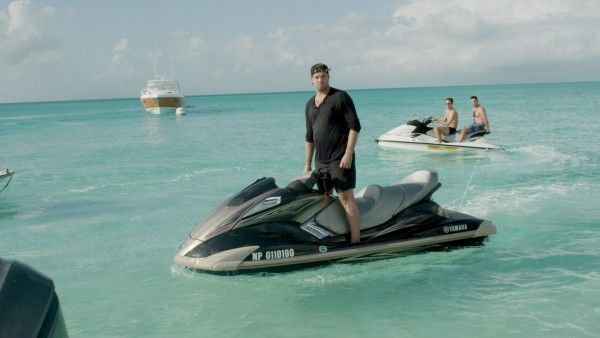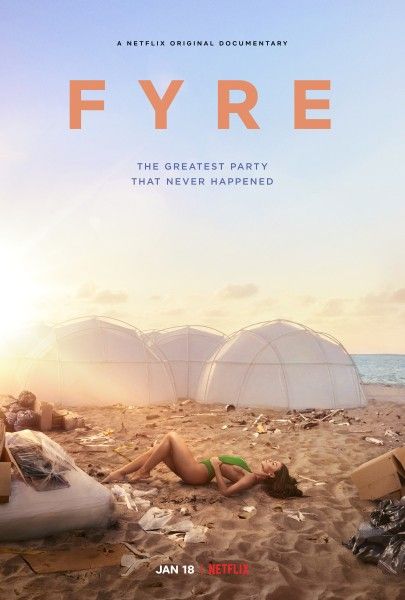On the surface, the Fyre Festival seems like a low-stakes disaster. It’s something horrible that happened to rich kids who spend too much time on Instagram, didn’t do their due diligence, and ended up chasing a fantasy to an awful time, but nobody died. Chris Smith’s documentary, Fyre, provides a solid overview of what happened and how it went so wrong. At the center of the controversy is entrepreneur/con artist Billy McFarland, whose desire to live the life of a mogul ended up dragging everybody else down. While the film glances at some interesting issues regarding weaponized social media, expectations versus reality, and how a con artist operates in the 21st century, Smith primarily keeps his focus on the “how” of Fyre Festival rather than the “why”.
In April 2017, social media exploded with news of Fyre Festival, a high-end, luxury music festival that turned out to be a complete disaster when none of the bands showed up, accommodations weren’t what was promised, and everything that had been sold turned out to be a total lie. The story begins five months earlier when, at the offices of Fyre Media, run by CEO Billy McFarland and his business partner/rapper Ja Rule, they decided to promote their upcoming app (which would have allowed people to book popular artists directly) with a music festival. Despite having no experience in setting up this kind of festival, McFarland and his partners put together a promotional video featuring Instagram influencers and models selling an exclusive, high-end getaway that would be unlike anything else. The documentary then chronicles how Fyre Festival was lies built on top of lies as no one acknowledged the serious logistical challenges facing a music festival in the Bahamas.
The one area where Fyre is both most effective and most frustrating is in showing the power of marketing. As The Ringer points out, Smith’s documentary is in a bit of an ethical bind as it aims to cover Jerry Media, who was responsible for putting together the promotional video for Fyre Festival, and also working with Jerry Media on Fyre. What you can see from the finished product is a film that doesn’t really question the role of advertisers while still saying that, if anything worked, it was the advertising. In the view of Fyre, Jerry Media did its job (despite not looking too closely at what they were selling), and the fault lies with the festival organizers who didn’t deliver on the promise of the advertising.
To be fair, if we’re looking at people who are responsible for the debacle, blame clearly goes to McFarland and Ja Rule, who weren’t interested in the logistics or the complications of this endeavor. Fyre goes back to McFarland’s previous endeavor, Magnesis, a high-end credit card, to show that McFarland’s reputation was built on smoke and mirrors, and whenever a bill came due, he would engage in a fresh round of fraud to keep everything moving. Fyre Festival was simply McFarland’s latest scam even if the business behind it, Fyre Media, appeared relatively sound in terms of its concept of having an app to book performing artists directly.
With no interest in the actual nuts-and-bolts of putting together a music festival, Fyre becomes a fascinating and entertaining look of what happens when people who don’t care about logistics are forced to deal with a logistical nightmare. There was nothing about Fyre Festival that was unforeseen as people were voicing concerns about bathrooms and lodging months ahead of the festival. These people were then pushed out and new people were brought in who wouldn’t question the “vision” of Fyre Festival and would go to great and disturbing lengths to make it a reality (one jaw-dropping scene has an organizer recounting the lengths he was willing to go to get the bottled water out of customs).
To Smith’s credit, he doesn’t boil Fyre Festival down to just rich douchebags who hurt other rich douchebags. He acknowledges all the people McFarland took advantage of, including the day laborers who worked to build the venue, the food service providers who catered to guests, and the employees of Fyre Media who were just trying to build an app but got roped into this gigantic scam. When you look at all these victims who, due to McFarland’s deception, are now out of money simply because they thought he was an honest broker, it’s tough to see his six-year jail sentence as anything but light.
Fyre is a snappy, engaging look at how Fyre Festival fell apart, but it leaves you wanting something a little bit deeper on the nature of McFarland’s crimes and what it says about our modern desires. How does someone like McFarland succeed, and is there any indication that he or someone like him will be stopped the next time a similar endeavor ropes people in through social media? Fyre Festival was a flop that captured the world’s attention, but Fyre doesn’t seem to have any answers on what’s stopping the next Fyre Festival from happening.
Rating: B
Click here for a review of Hulu's competing Fyre Festival documentary, Fyre Fraud.





